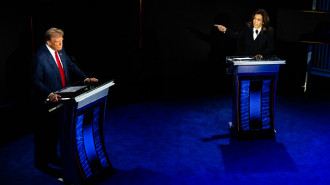Iran's Rouhani challenges hardline rival presidential candidate: 'arrest me'
Iranian President Hasan Rouhani on Friday challenged a fellow candidate in the country's presidential elections to "issue an arrest warrant" against him, as the moderate figure continues to adopt a combative approach during his quest for re-election.
During a blistering presidential debate, the third and final before elections take place on May 19, Rouhani clashed with hardline candidate Ebrahim Raisi, a former high-ranking judge in Iran's Sharia-governed judicial system, during a debate over minority rights.
During his election campaign in 2013 Rouhani called for a greater realisation of rights for minorities, and his government has implemented legislation permitting students in Iranian Kurdistan to study the Kurdish language at school, with some universities also set to introduce further studies in Kurdish.
Final presidential debate
Speaking on Friday Rouhani said that if re-elected he would continue to work for the realisation of greater rights for minority religious and ethnic groups.
But in response Raisi sought to downplay Rouhani's achievements, arguing that both God and the country’s constitution were the prime sources supporting minority rights.
"How come you think you were the one who allowed Kurdish language (to be taught)? God allowed it. The constitution has allowed that they use their language and their alphabet," said Raisi.
"The Kurds, the Baluchis and others have these rights granted by God and the government must ensure them."
Afterwards Rouhani reacted angrily stating: "Mr. Raisi, you can slander me as much you wish. As a judge of the clerical court, you can even issue an arrest order. But please don't abuse religion for power."
While Article 15 of the Iranian Constitution, on paper, allows Kurdish and other spoken languages to be taught in schools and higher education systems, there has been little practical progress towards such a realisation of rights since the country’s 1979 revolution.
According to Amnesty International minority groups in Iran including Kurds, Ahwazi Arabs, Azerbaijani Turks, Baluchis, and Turkmen, continue to face entrenched discrimination that often contributes to curtailing their access to employment, adequate housing, political office, and their exercise of cultural, civil and political rights.
While western rights groups reacted positively to Rouhani's calls for the realisation of greater rights for all Iranians during his 2013 election campaign they have also bemoaned a lack of significant progress on the issue over the past four years.
A pugnacious approach
It is not the first time during the election campaign that Rouhani has clashed with Raisi.
During a rally on Monday in an unprecedented critique Rouhani suggested that Raisi's only talents were conducting executions, and imprisoning people.
"The people of Iran will announce in this election that they don’t accept those who only knew executions and prison for 38 years," said Rouhani at the Monday rally.
Raisi was notoriously one of four judges who presided over the 1988 mass execution of thousands of dissidents.
In recent weeks on the campaign trail Rouhani has also taken aim at the country's Revolutionary Guards claiming that the military institution had attempted to scupper a landmark nuclear deal signed by Tehran in late 2015 with the US, and five other world powers.
At the time anaylsts said that the critique on the Revolutionary Guards could detrimentally affect Rouhani’s election campaign.
Rouhani is seen as the favourite of three moderate candidates taking part in elections, but he is expected to face a strong challenge from Raisi, who is viewed as the clerical establishment’s favoured figure.
Rouhani is seeking to draw the estimated 40 percent Iran's 55 million population who do not usually vote to the polls in order to push him ahead of Raisi in a popular vote.

![Palestinians mourned the victims of an Israeli strike on Deir al-Balah [Getty]](/sites/default/files/styles/image_684x385/public/2024-11/GettyImages-2182362043.jpg?h=199d8c1f&itok=xSHZFbmc)


![The law could be enforced against teachers without prior notice [Getty]](/sites/default/files/styles/image_684x385/public/2178740715.jpeg?h=a5f2f23a&itok=hnqrCS4x)
 Follow the Middle East's top stories in English at The New Arab on Google News
Follow the Middle East's top stories in English at The New Arab on Google News

![Voters in Michigan [Getty]](/sites/default/files/styles/image_330x185/public/2182490468.jpeg?h=a5f2f23a&itok=XMi_sWGX)
